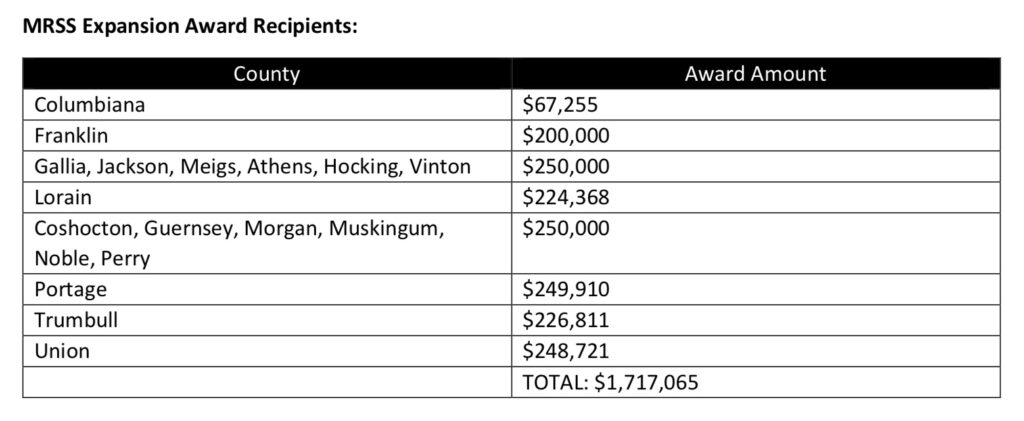Meigs Among Counties Receiving Grants to Support Mental Health and Addiction Services


Meigs Among Counties Receiving Grants to Support Mental Health and Addiction Services
COLUMBUS, Ohio —The Ohio Department of Mental Health and Addiction Services (OhioMHAS), in partnership with Ohio Governor Mike DeWine’s Children’s Initiative and the Ohio Department of Medicaid, today announced eight grant awards totaling just over $1.7 million to expand mobile crisis services for children and families to 18 additional counties. Meigs County is among those receiving funding.

Ohio’s Mobile Response and Stabilization Services (MRSS) program provides mobile, on-site and rapid intervention for youth experiencing a behavioral health crisis, allowing for immediate de-escalation of the situation in the least restrictive setting possible; prevention of the condition from worsening; and the timely stabilization of the crisis. The mobile crisis component of MRSS is designed to provide time- limited, on-demand crisis intervention services in any setting in which a behavioral health crisis is occurring, including homes, schools, and emergency departments. Depending on the needs of the child, the stabilization component may include a temporary, out-of-home crisis resolution in a safe environment.
“These investments are an important step forward for Ohio in meeting the needs of children and families experiencing a mental health crisis,” said Governor Mike DeWine. “While nobody can predict when and where a mental health crisis will occur, Ohio’s MRSS Program represents an important first line of defense in providing timely access to services, improving outcomes for children and families, and reducing burdens on law enforcement and emergency departments.”
“The goal of this program is to intercede before urgent behavioral situations become unmanageable emergencies,” said OhioMHAS Director Lori Criss. “This expansion will allow us to engage young people and their families immediately to de-escalate a crisis and provide local stabilization services that help keep them safe and healthy in their own homes and communities.”
Funding to expand Mobile Response and Stabilization Services was a key priority in the state’s recently enacted operating budget. Benefits of MRSS programming include:
• Cost-effective method for improving behavioral health outcomes;
• Reducing/deterring emergency department visits and inpatient admissions;
• Reducing out-of-home placements;
• Reducing lengths of stay and the cost of inpatient hospitalizations; and
• Improving access to behavioral health services.
Ohio’s MRSS program serves youth ages birth to 21, and their families. OhioMHAS previously established pilot programs in two regional collaboratives comprised of 13 counties: Allen, Auglaize, Butler, Clermont, Clinton, Hancock, Hardin, Lucas, Paulding, Preble, Putnam, Warren, and Wood. OhioMHAS and its partners are currently working to develop MRSS in the comprehensive system of crisis care for children, youth and families through the OhioRISE Program as a billable service to be launched in 2022.
“Research shows that children in crisis do better when they are provided safe and effective interventions that keep them close to family and the communities they know,” said Ohio Medicaid Director Maureen Corcoran. “The MRSS grants enhance community resources in supporting families
during emergencies and represent an important step state’s OhioRISE program.”






